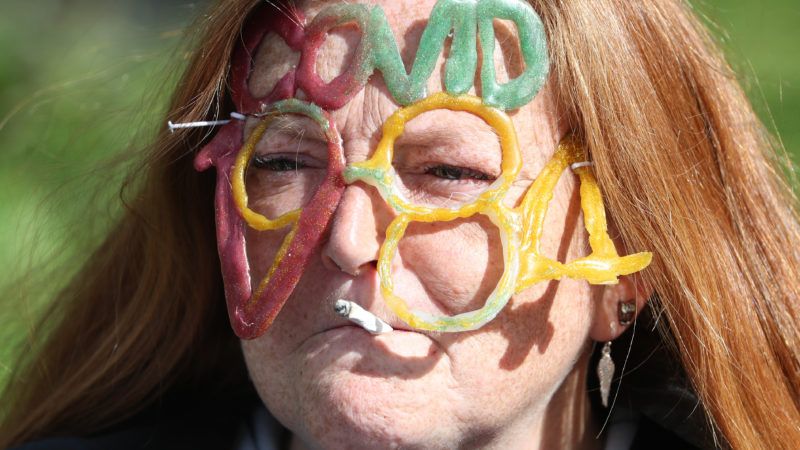The COVID-19 Pandemic Keeps Proving Deadly to Liberty
As the pandemic rages on, nominally free countries are sliding down a path blazed by authoritarian regimes.

This week, the British government announced limits on gatherings of people who don't live together to groups of no more than six. Although the restriction seriously attacks freedom of assembly, it barely raised an eyebrow in an era of similar intrusions. How could it stand out when countries around the world are tightening the screws on speech, movement, business, and social connections in the name of public health?
As many people feared, the COVID-19 pandemic—or rather, the government response to it—is proving quite deadly to liberty. And too many people seem happy to go along.
"From Monday, we're introducing the 'Rule of 6'," tweeted Matt Hancock, U.K. Secretary of State for Health and Social Care. "If you meet socially in groups of more than 6, you will be dispersed, fined & possibly arrested by the police. If we work together in the national interest, we can defeat this unprecedented #coronavirus."
The "Rule of 6" does allow for some exceptions, including "protests and political activities," but only subject to government guidance that makes in-face meetings privileges under nanny's scrutiny.
While authoritarian governments commonly criminalize gatherings of potential dissidents, meeting to oppose the current batch of seat-warmers in favor of your own lot is essential to the democratic experience in nominally free countries. It's also a fundamental right to gather with friends, co-religionists, colleagues, and family as part of civil society—the sections of the world that matter, beyond the boundaries of government.
But Britain's restrictions on assembly pale in comparison to the pre-crime arrests police in the Australian state of Victoria made of those who just advocated public demonstrations against government policy.
Zoe Buhler, a pregnant woman who had called on social media for peaceful protests against the state's draconian pandemic lockdown, live-streamed her own arrest. Police hauled her off even after she offered to delete the offending post.
At least Buhler's door is still on its hinges. Victoria police broke into James Bartolo's home and tackled him to the floor. Again, his crime was openly advocating protest against government policy.
The protests proceeded anyway, in defiance of the law. Of course, attendees criticizing government policy were arrested.
These days, you don't have to assemble or even advocate assembly to get arrested in France; you just have to insult a mayor. The elevated penalty of community service plus a €7,500 fine for those who express "contempt" for mayors is being imposed after local officials complained of 233 physical attacks, up from 198 during the same period last year.
Then again, France has always frowned on harsh words directed at government institutions and officeholders, criminalizing speech defined as defamation and contempt. The extraordinary circumstances of COVID-19 provide an opportunity to impose extraordinary penalties further shielding the delicate feelings of government officials from the scorn of their subjects.
In July, David Kaye, the United Nations Special Rapporteur on Freedom of Expression, warned that "in the past three months, numerous governments have used the COVID-pandemic to repress expression in violation of their obligations under human rights law." But the countries he cited were mostly the usual suspects, such as Belarus, China, and Turkey. To see Australia, Britain, and France take advantage of the pandemic to impose restrictions and penalties on free speech and assembly is to see established and theoretically stable liberal democracies follow a path blazed by authoritarian countries.
To-date, free speech seems safer for Americans than for some of our overseas friends—we can still say pretty much what we want about government officials and their policies. Events in Portland and elsewhere suggest that we can even gather to do so publicly, if sometimes more violently than might be advised.
Still, Americans have been subject to lockdown orders, travel restrictions, mask mandates, and other requirements and prohibitions supposedly intended to protect our health, but definitely injurious to our liberty.
"In halls of power across the country, the growing novel coronavirus pandemic has sometimes been used to stretch, bend or ignore established law and policy," Jenny B. Davis wrote for the ABA Journal back in April, even before some of the worst strictures were in place. "Fundamental freedoms, privacy protections and access to justice have been curtailed in the name of public safety, with legal justifications ranging from appropriate to patently inaccurate."
Alleged public safety measures, unrestrained by limits on power, can inflict their own costs on health as well as freedom.
"Dangers looms when one person tries to regulate the lives of millions," writes physician assistant Jordan Warnsholz, who is suing Michigan Gov. Gretchen Whitmer over her restrictions. "Whitmer's orders are a case in point. One banned any 'non-essential' medical procedures and elective surgeries… There's no doubt that banning these procedures harmed the health and safety of my patients."
The damage is worse, though, when frightened people imagine that the curtailment of liberty is a good thing and become complicit in the oppression of themselves and their neighbors.
Pollsters find that a majority of Michigan voters actually approve of Whitmer's heavy-handed mismanagement of the pandemic response. They also oppose repealing the 1945 law that allows the governor to unilaterally declare an emergency and rule without legislative input.
In Australia, Victoria's voters also cheer on the restrictive regime under which they live. "Overall, public opinion seems solidly behind the curtailment of civil liberties that would have been unthinkable a month ago," reports The Guardian.
It's difficult to imagine government officials—having exercised unprecedented control over our lives, often to popular applause—willingly restoring our freedom. The big takeaway from the pandemic era might not be the ease with which governments steal away our freedom by invoking the alleged necessities of a crisis. The real revelation is how little effort it takes to make many people like it.


Show Comments (193)